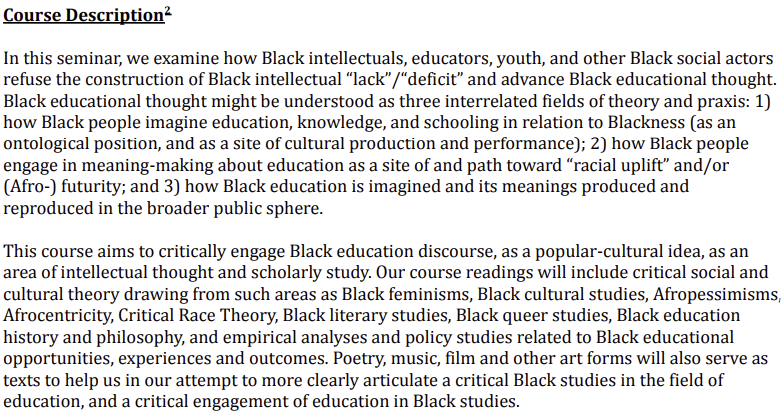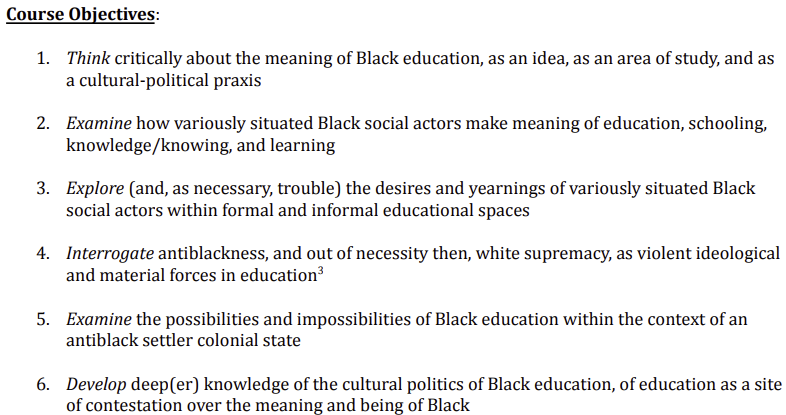University of Pittsburgh (CorruptED)
Incidents
The University of Pittsburgh’s School of Education offers courses that feature topics such as critical pedagogy, critical race theory, and tenets of queer theory. Texts include Paulo Freire’s Pedagogy of the Oppressed, Bell Hooks’ Feminism is for everybody: Passionate politics, and Ozlem Sensoy and Robin DiAngelo’s Is everyone really equal?: An introduction to key concepts in social justice education.
COURSES
EDUC 2011/1011-1100: Culturally Responsive Pedagogy
The course EDUC 2011/1011-1100: Culturally Responsive Pedagogy features content such as critical pedagogy and culturally responsive teaching. Course texts include Paulo Freire’s Pedagogy of the Oppressed.
The course description states that it “introduces students to theory, research, and especially practice related to developing and enacting curriculum and instructional practices that respond to the social context in which they (will) work. The course takes an introspective approach of understanding one’s own background and experiences, as well as one’s worldview that may be shaped by particular biases.”

EDUC 2110 & 1110/EFOP 2133: Gender and Education
The course EDUC 2110 & 1110/EFOP 2133: Gender and Education features content including tenets of queer theory and the course text Feminism is for everybody: Passionate politics by Bell Hooks.
The overview states that the course “examines research and theory on gender as it pertains to the development of pedagogy, curriculum, and educational praxis.” The readings and discussions “will also explore gendered perspectives and gendered policy frames.”

EDUC 3004: Contexts of Practice
The course EDUC 3004: Contexts of Practice features topics such as critical theory, tenets of queer theory, and white privilege. Course texts include Ozlem Sensoy and Robin DiAngelo’s Is everyone really equal?: An introduction to key concepts in social justice education and Paulo Freire’s Pedagogy of Freedom.
The description states that the course is an “overview of the structural relationships informing education and educational systems” and will “examine the historical and philosophical roots of education and analyze the nature of power, culture, resources, and identity in educational contexts.”

EDUC 3045: Critical Race Theory Education
The course EDUC 3045: Critical Race Theory Education features topics such as critical race theory, LatCrit, and TribalCrit.
The course description states that its central aim is to “gain a richer understanding of how CRT can be employed as a framework that guides our respective research and activism by challenging ‘race/racism and other forms of subordination shaping disparate educational opportunities for Communities of Color.'” The course objectives include the ability to “use Critical Race Theory as a method and tool of analysis” and “understand the evolution of CRT as it relates to TribalCrit and LatCrit.”

The course catalog explains that EDUC 3045 will consider the following questions:
- “How are racial inequities produced, reproduced, and maintained in education and society?”
- “In what ways is critical race theory used as an analytic tool to explain policy, reform, practice and other phenomena?”
- “In what ways is critical race theory used as a framework to conceptualize research?”

Required readings include literature such as:
- Toward a Tribal Critical Race Theory in Education
- Critical race theory and white racism: is there room for white scholars in fighting racism in education?
- Critical Race Theory, Race Equity, and Public Health: Toward Antiracism Praxis
- Critical race theory, race and gender microaggressions, and the experience of Chicana and Chicano scholars
- Toward a Critical Race Theory of Education
- Critical Race Methodology/ Counter-Storytelling as an Analytical Framework for Education Research
- Critical Race Theory, Latino Critical Theory, and Critical Raced-Gendered Epistemologies: Recognizing Students of Color as Holders and Creators of Knowledge
EDUC 3114: Black Educational Thought
The course EDUC 3114: Black Educational Thought features topics such as critical race theory and black queer studies.
The description states that it “aims to critically engage Black education discourse, as a popular-cultural idea, as an area of intellectual thought and scholarly study. Our course readings will include critical social and cultural theory drawing from such areas as Black feminisms, Black cultural studies, Afropessimisms, Afrocentricity, Critical Race Theory, Black literary studies, Black queer studies, Black education history and philosophy, and empirical analyses and policy studies related to Black educational opportunities, experiences and outcomes.”

Under the heading “Assumptions about the Field and Study of Education,” the course syllabus states that “We are inherently invested in practice, not simply as an idea, but as implementable
operations, either by us directly, or through our students and other partners in the communities
within which we work…Education as an applied field offers the possibility of praxis. However, it is also a field replete with violence and threat of violence against those who might wish to engage in liberatory practice, either as students, educators, or as cousins and aunties.”
The course objectives include students’ ability to “think critically about the meaning of Black education,” “examine the possibilities and impossibilities of Black education within the context of an antiblack settler colonial state,” and “develop deep(er) knowledge of the cultural politics of Black education, of education as a site of contestation over the meaning and being of Black.”

A footnote in the syllabus clarifies that the instructors “do not capitalize antiblackness” because the term refers to “‘a social construction of racial meaning’ …or what is imagined about Black people rather than what Black people and organizations self-determine.”

The syllabus encourages the class to “check in with one another in ways that honor our differences but affirm our membership in a community of conscience,” “excuse [themselves] without explanation in order to take necessary space,” and “make culturally specific requests as soon as you realize you need to.”
The required text for this course is Grant, C. A., Brown, K. D., & Brown, A. L. (2016). Black intellectual thought in education: The missing traditions of Anna Julia Cooper, Carter G. Woodson, and Alain LeRoy Locke, paired with other undisclosed readings uploaded to an online platform for students.
Stay Informed
